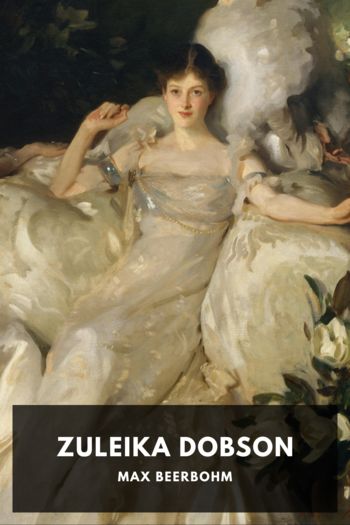Zuleika Dobson - Max Beerbohm (good e books to read txt) 📗

- Author: Max Beerbohm
Book online «Zuleika Dobson - Max Beerbohm (good e books to read txt) 📗». Author Max Beerbohm
Though Zuleika had never given her heart, strong in her were the desire and the need that it should be given. Whithersoever she had fared, she had seen nothing but youths fatuously prostrate to her—not one upright figure which she could respect. There were the middle-aged men, the old men, who did not bow down to her; but from middle-age, as from eld, she had a sanguine aversion. She could love none but a youth. Nor—though she herself, womanly, would utterly abase herself before her ideal—could she love one who fell prone before her. And before her all youths always did fall prone. She was an empress, and all youths were her slaves. Their bondage delighted her, as I have said. But no empress who has any pride can adore one of her slaves. Whom, then, could proud Zuleika adore? It was a question which sometimes troubled her. There were even moments when, looking into her cheval-glass, she cried out against that arrangement in comely lines and tints which got for her the dulia she delighted in. To be able to love once—would not that be better than all the homage in the world? But would she ever meet whom, looking up to him, she could love—she, the omnisubjugant? Would she ever, ever meet him?
It was when she wondered thus, that the wistfulness came into her eyes. Even now, as she sat by the window, that shadow returned to them. She was wondering, shyly, had she met him at length? That young equestrian who had not turned to look at her; whom she was to meet at dinner tonight … was it he? The ends of her blue sash lay across her lap, and she was lazily unravelling their fringes. “Blue and white!” she remembered. “They were the colours he wore round his hat.” And she gave a little laugh of coquetry. She laughed, and, long after, her lips were still parted in a smile.
So did she sit, smiling, wondering, with the fringes of her sash between her fingers, while the sun sank behind the opposite wall of the quadrangle, and the shadows crept out across the grass, thirsty for the dew.
IIIThe clock in the Warden’s drawing-room had just struck eight, and already the ducal feet were beautiful on the white bearskin hearthrug. So slim and long were they, of instep so nobly arched, that only with a pair of glazed ox-tongues on a breakfast-table were they comparable. Incomparable quite, the figure and face and vesture of him who ended in them.
The Warden was talking to him, with all the deference of elderly commoner to patrician boy. The other guests—an Oriel don and his wife—were listening with earnest smile and submissive droop, at a slight distance. Now and again, to put themselves at their ease, they exchanged in undertone a word or two about the weather.
“The young lady whom you may have noticed with me,” the Warden was saying, “is my orphaned granddaughter.” (The wife of the Oriel don discarded her smile, and sighed, with a glance at the Duke, who was himself an orphan.) “She has come to stay with me.” (The Duke glanced quickly round the room.) “I cannot think why she is not down yet.” (The Oriel don fixed his eyes on the clock, as though he suspected it of being fast.) “I must ask you to forgive her. She appears to be a bright, pleasant young woman.”
“Married?” asked the Duke.
“No,” said the Warden; and a cloud of annoyance crossed the boy’s face. “No; she devotes her life entirely to good works.”
“A hospital nurse?” the Duke murmured.
“No, Zuleika’s appointed task is to induce delightful wonder rather than to alleviate pain. She performs conjuring-tricks.”
“Not—not Miss Zuleika Dobson?” cried the Duke.
“Ah yes. I forgot that she had achieved some fame in the outer world. Perhaps she has already met you?”
“Never,” said the young man coldly. “But of course I have heard of Miss Dobson. I did not know she was related to you.”
The Duke had an intense horror of unmarried girls. All his vacations were spent in eluding them and their chaperons. That he should be confronted with one of them—with such an one of them!—in Oxford, seemed to him sheer violation of sanctuary. The tone, therefore,





Comments (0)